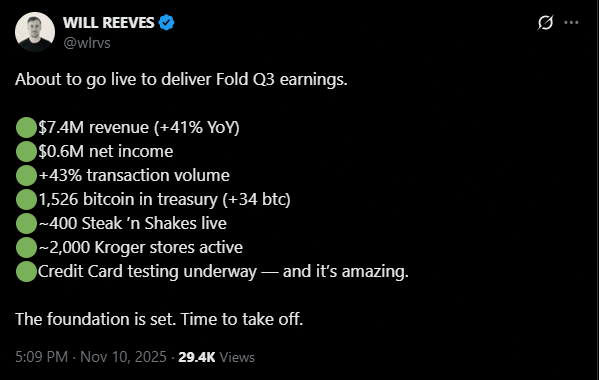Ten31 Timestamp 923,744
You’re bearish?
IBIT is now Harvard’s largest publicly disclosed position, and you’re bearish?
Square just activated built-in bitcoin payment rails for 4 million merchants, and you’re bearish?
Central banks are starting pilot programs to hold bitcoin while sovereign wealth funds 2-3x their holdings in one quarter, and you’re bearish?
The Trump administration is going to use stimulus checks, mortgage financing subsidies, and untold political largesse to pump sentiment into midterms, and you’re bearish?
The government just reopened after the longest shutdown in history with a newly refilled TGA, and you’re bearish?
The Fed is conducting hasty meetings with repo market primary dealers to address ongoing tightness in reserves, and you’re bearish?
QT ends in December, and you’re bearish?
We’re going to win, and you’re bearish?
Portfolio Company Spotlight
Coinkite develops best in class consumer tools for interacting with bitcoin, including the Coldcard Q and Mk4 – two highly secure hardware signing devices that set the standard for private key custody – physical bearer instruments (Opendime and Satscard), an NFC-enabled card for signing transactions (Tapsigner), and much more. The company’s product portfolio balances security with usability and includes some of the most widely used products in the bitcoin ecosystem among both consumers and institutions.
As the world’s largest investor focused entirely on bitcoin, Ten31 has deployed over $200 million across two funds into more than 30 of the most promising and innovative companies in the ecosystem, and we expect 2025 to be the best year yet for both bitcoin and our portfolio. Visit ten31.xyz/invest to learn more and get in touch to discuss participating.
Selected Portfolio News
Fold posted a solid third quarter update this week:
Maple AI rolled out Maple 2.0, a major new update with new features including live data capabilities:
Nodl announced Onyx, a major upgrade to its bitcoin node product:
Media
Strike Founder and CEO Jack Mallers headlined a fireside chat at the Bitcoin Amsterdam conference.
Coinkite Co-Founder and CEO NVK joined Ten31 Managing Partner Matt Odell on Citadel Dispatch to discuss the latest in bitcoin self-custody.
Market Updates
After the longest federal shutdown in history, Congress finally voted to reopen the government at least through January on Wednesday night.
Unfortunately, the long-awaited shutdown resolution didn’t help investors feel any better, as major equity indices had their worst day in a month on Thursday, followed by tepid performance on Friday.
Interestingly, yields on government long bonds (traditionally the safe haven assets) went higher on the risk-off downdraft, with the 10-year closing the week ~10bps above mid-week levels.
It’s also interesting that the equities nuke came the day after Trump held a private dinner with a who’s-who of key finance executives, though we’re sure that’s probably nothing.
Bitcoin was, once again, a victim of the same risk-off pressures, losing the $100,000 level bulls have defended for much of this year and falling as low as ~$95,000.
Despite the government reopening, the White House suggested that gaps in official unemployment and inflation data from the shutdown period may never be filled due to “permanent damage to the federal statistical system.”
That said, the incremental data points that have trickled in have not painted a terribly encouraging picture for the real economy, as ADP payrolls data came in weak for October, and new foreclosures increased 20% last month (though this metric remains below its historical average).
The Financial Times reported that New York Fed President John Williams conducted a “hastily arranged meeting” with a consortium of primary dealer partners this week to address ongoing tightness in the repo market and banks’ use of the Standing Repo Facility, as overnight rates once again drifted above the Fed’s policy rate corridor to close the week.
BlackRock wrote off a loan of up to $150 million to Renovo, a struggling home renovation company that abruptly filed for bankruptcy last week, the latest small but noteworthy “cockroach” to emerge from the private credit complex in recent weeks.
Elsewhere in the credit complex, hyperscaler credit default swap spreads have begun to move sharply higher over the last few weeks. There are several potential explanations for the spikes, but the moves bear monitoring in a tight credit environment, particularly given the size of the capital commitments at play and the increasingly opaque leverage arrangements employed.
With consumer and investor sentiment deteriorating on the back of headwinds in the real economy and tight liquidity, President Trump attempted to come to the rescue with a resurgence of Helicopter Money, including reiterating his desire for tariff dividends of “at least $2,000” to low- and middle-income households, as well as the sketch of the concept of the idea of a plan for federally subsidized 50-year fixed rate mortgages (though the White House later backed off from the latter idea).
A near-term headwind to some of these plans may come from division within the FOMC, which the Wall Street Journal’s Fed insider reported is now increasingly torn on moving forward with another rate cut in December.
Meanwhile, Boston Fed President Susan Collins publicly confirmed she is reluctant to vote for any more cuts, though new appointee Stephen Miran continued to disagree (while acknowledging that Quantitative Easing may have been “overused’ in the past).
On the trade war front, China is reportedly working on a system to continue limiting US rare earth exports for critical military applications while still technically abiding by its pledge from last month’s Trump-Xi summit.
For its part, the EU announced an accelerated end to the “de minimis” exemptions previously used for low value Chinese imports, following the US’s lead from earlier this year. The move comes in the wake of a substantial uptick in Chinese goods shipments to global markets following reduced flows to the US.
The White House announced a barrage of tariff cuts on various food imports to help alleviate high prices, while also announcing new trade deals with several Latin American countries in the US’s sphere of influence.
Elsewhere in hemispheric hegemony, Secretary of War Pete Hegseth said the US is preparing a new military operation to target “narco-terrorists” with a focus on Venezuela, explicitly indicating that “the Western Hemisphere is America’s neighborhood.”
It was a tough week for bitcoin price action, but it was also a week loaded with fundamentally bullish headlines, perhaps most notably fintech giant Square activating bitcoin payment options for its 4 million merchants, with no fees until 2027.
Notably, the new capabilities allow CashApp (and Strike) users to pay with dollars over bitcoin, bringing bitcoin one step closer to becoming a widely adopted currency-agnostic payments rails for everyday transactions.
On the institutional front, Harvard’s endowment reported a 3.5x increase in its IBIT position since last quarter (as well as a doubling of its GLD holdings), making IBIT Harvard’s largest publicly disclosed equity position. Emory University’s endowment also doubled its GBTC holdings and added a new GLD position.
At the same time, Al Warda Investments, a sovereign wealth fund of the UAE, more than tripled its IBIT position, and Luxembourg’s Sovereign Wealth Fund said it will allocate 1% of its reserves to bitcoin.
Finally, the Czech National Bank officially made its first $1 million “test purchase” of bitcoin as part of a program to, in the words of the central bank’s leader, “prepare for the future.” Taiwan’s central bank also indicated it will explore a pilot program to hold bitcoin.
Regulatory Update
The Senate’s Agricultural Committee released a draft of its part of the upcoming “market structure bill” for digital assets, which appears to classify bitcoin and Ethereum as “digital commodities” (making ETH the first commodity in history with an issuer and a roadmap).
Encouragingly, the draft appears to include favorable language to protect developers of non-custodial software.
Noteworthy
The payment network duopoly of Visa and Mastercard proposed a settlement to their 20-year lawsuit on the per-swipe rates charged to merchants. The arrangement would see swipe fees gradually reduced by 10 basis points per year for five years, though the proposal received pushback from many merchant groups.
After a rough year for leading bitcoin treasury company Strategy, famed short seller Jim Chanos announced he has closed out his MSTR short position.
Michael Burry – made famous by his massive “Big Short” of the housing bubble – finally seemed to capitulate to the irrationally exuberant market this week, returning all outside capital to his investors. The Iron Law of Permabear Capitulation unfortunately dictates that we are now due for a major pullback.
China accused the US of stealing over 127,000 bitcoin as part of a 2020 hack of a Chinese mining pool.
Travel
Austin Bitdevs, Nov 20





